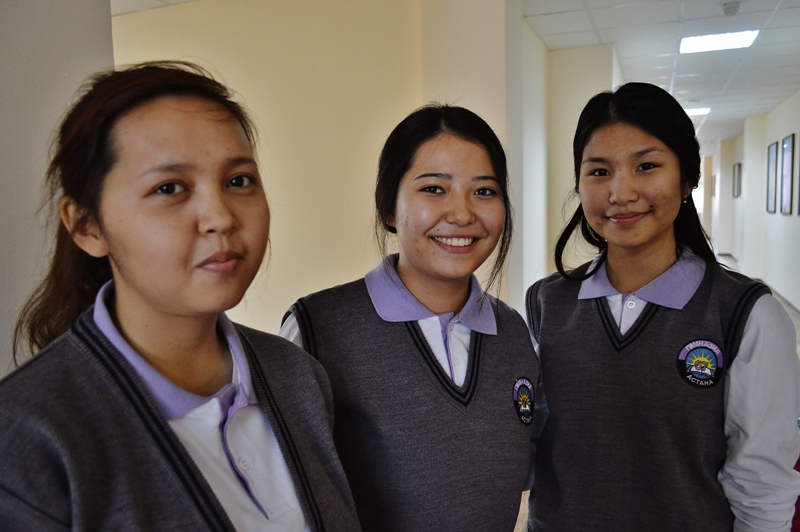ASTANA – Astana’s public school No. 67 is the newest partner in the German language programme DSD, a 22-year-old government-funded initiative that partners with public schools around the world to promote the German language.
The programme, funded by the German Central Agency for Schools Abroad (ZfA), sends native German speakers to teach, supplies schools with teaching materials for its German courses and provides teacher training and other support. It also puts students in countries around the world on track to earn the German Language Diploma of the Standing Committee (DSD), an German language and university preparation test that offers a gateway to German universities. Students who pass the exam can go on to study at German universities without further language testing.
As Germany recently scrapped tuition fees in its public universities, higher education in the country is free for any student, German or international, and the DSD programme represents a significant opportunity. Twenty-seven students from Kazakhstan went on to study in Germany through the programme last year, Frauke Woitsch, ZfA consultant and coordinator in Kazakhstan, told The Astana Times on Oct. 23. She points out that not all students in the programme reach the language level necessary to earn the German language diploma; for many the point of the programme is simply to learn and achieve a high level of German.
School No. 67 joined the programme one year ago, after receiving permission from Kazakhstan’s Ministry of Education and Science and undergoing the application process, and since then has seen German proficiency among its students soar, Headmistress Gulnara Sadekova said in an interview at the school on Oct. 16.
“Our school is based on language, so it’s a multilingual school. … After the programme, our school improved. The level of German language is really developing. German is now at the same level as English,” she said. Chinese, French and Russian are also taught at the school.
Blond, mohawked Tanja Unterberg is the coordinator of the DSD programme at Astana’s public schools No. 67 and No. 46, where she stands out amid the sea of mostly Kazakh students and teachers. Unterberg, like four other teachers working at DSD schools in Kazakhstan through a cultural cooperation agreement between German and Kazakhstan, coordinates teacher trainings, helps set common goals between the school and the programme, organises students to take part in competitions in Germany and gives lessons to the school’s higher-level students.
Despite their different styles and features, Unterberg says German and Kazakh cultures have a natural fit and the integrated programme is very special. “Normally we have German schools – German directors, German colleagues, everything is from Germany. But this cooperation is between two different countries, with two different cultures. The headmistress is Kazakh – there’s no German. There are some people from abroad, like my German boss in Almaty, and this is interesting, because it’s an intercultural blend, because we’re cooperating. There is a good blend between traditions.”
Before coming to Kazakhstan, she hadn’t realised the two cultures would have much in common, Unterberg said. “I would say we have much in common. We both like working, lots. Our cultures are close – there are things we have in common. Our cultures can combine. We have something between us. … I didn’t know that [before],” she said.
Unterberg extends the integration within the school by opening her seminars to all teachers. “We are now doing some bilingual method courses. … We gather two times a month. The last course we made was about communicative confidence, how we build it from the little ones to the 11th class. Not officially – I’m officially here for the German, but it would be silly to give a class for just two teachers.” She is also passionate about finding internships and practical training for her students, hoping to bring some of Germany’s hands-on, real world educational style to Kazakhstan.
Aigerym Nauryzbekova, 16, travels across town to attend school No. 67. She used to live in the school’s district, and decided to stay on after her family moved elsewhere in Astana. “The first reason is that it is a multilingual school, and I always loved English, so I wanted to develop it,” she said.
Nauryzbekova and other students gave a tour of their school on Oct. 16, translating between English, German, Russian and Kazakh. They hope to put their language skills to use after graduation. Aibol Gablakhat, 18, hopes to be an ambassador. “I like travelling – I want to travel the whole world,” he said. Dana Baubekova, 15, wants to learn more languages and perhaps return to school No. 67 as a teacher, she said.
There are currently eight DSD schools in Kazakhstan, Woitsch said, and 821 across the world, in 65 countries. As the DSD consultant, Woitsch coordinates and advises participating schools on their programmes and administers the DSD test.



